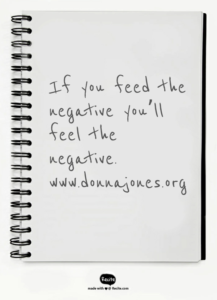What if the answer to one question could determine your contentment in life?
It can and it does. Here it is:
Do you think about what you think about?
Most people allow thoughts to enter and exit their brains without paying much attention to the flow. What we do notice, though, is our emotions—especially our intense negative ones—like worry, resentment, anger or fear. Toss in a smidge of jealousy, frustration or regret and you’ve got a full-blown recipe for a mental meltdown. Or in more mild situations, feeling blue. Or blah. Or bummed.
Anything but content.
Our unsettled, tangled emotions often catapult us into one of two responses; a spiral deeper into an emotional pit or a knee-jerk emotional re-action to fix the “problem”. While fixing the problem is a good idea, more often than not, the “problem” starts with us and what goes on in our head.
My mentor, the late Anne Ortlund, used to say, “90% of living takes place between your ears.”
Negative thoughts never lead to a positive life.
This morning I opened my Bible and noticed words I’d scribbled across the top of a page many months ago. “What you feed grows”.
If you feel something consistently it’s because you’ve fed it continually.
My Pastor-hubby, JP, explains the thought/emotion/action correlation using the analogy of a pot of boiling water on a stove. “The fire of our thoughts boils the water of our emotions, which produces the steam of our actions.” You can control the steam one of two ways:
1. Put on a bigger lid.
2. Turn down the heat.
Bigger lids never work because lids only cover real issues. Eventually, steam seeps out. You’ve seen it, lived it, and so have I.
Be nice.
Don’t lose your patience.
Bite your tongue.
These mantras are fine for a moment, but over the long haul our real feelings boil over into our actions like steam on a raging stove. Then, depending upon our behavior, we feel like losers or like louses—anything but women at peace and content.
The only way to manage our actions is to manage our emotions. We manage our emotions by managing our thoughts.
In other words, we must think about what we think about. The principle is all over the pages of the Bible.
“And now, dear brothers and sisters, one final thing. Fix your thoughts on what is true, and honorable, and right, and pure, and lovely, and admirable. Think about things that are excellent and worthy of praise.”
(Philippians 4:8)
“Guard your heart above all else, for it determines the course of your life.”
(Proverbs 4:23)
Negative thoughts never lead to a positive life.
That’s not to say we have to live with our heads in the sand, avoiding all problems. It does mean, though, we must weed the negative not feed the negative, especially as it relates to things that steal our peace, sap our strength and rob our joy.
If you feed the negative you’ll feel the negative.
How do you live this in real life?
Are you ready for a little experiment in applying the scripture and becoming more content? More soul settled?
I am. So here we go:
At the top of a piece of paper write the name of a person, place or presenting problem that’s occupied your mind with negative thoughts, leading to negative emotions and/or negative actions. Pick one of the following exercises to do daily for the next week.
- List everything true, good, excellent or praiseworthy about the person, place or problem.
- Give thanks (out loud, if possible) for the person, place or problem. This person, place or problem might just be the answer to your holiest prayer—to make you more like Jesus.
- On one side of a page write your problem, on the other write down the characteristics of God. Look at your problem in light of God’s sovereignty, power, goodness and love for you.
- Spend five minutes talking to God about the person, place or problem, then (and this is key!) spend five minutes listening to God as He talks to you about the person, place or problem.
The answer to one question determines your peace and your contentment. It’s not “how good are my circumstances?” Rather, it’s “how good am I at thinking about what I think about?”
Special Note: Until June 15th only, you can buy SEEK: A Woman’s Guide to Meeting God for your Kindle or e-reader for ONLY $1.99 on Amazon. This offer is too good to miss, so grab SEEK for $1.99 and tell your friends!!!



Dear Donna,
Thank you for this exercise I really needed it at the time and will use it again. I had written about my husband and come to see he is an amazing giving and loving husband which I couldn’t see. This is my response to this exercise.
1. My husband is a hard worker, cyclist, handsome, loyal, kind, friendly, nice, accommodating, helpful, good sense of humor, He cooks, provides a roof over our head, prays, listens and supports me. He is a Christian.
2. Give thanks to the Lord for my husband
3. My husband invalidated my request as unimportant. I asked him to sort his dirty clothes in the laundry sorter container rather than just throwing them in one of the slots. It makes it easier and faster for me to wash the clothes without having to sort it.
God is loving, accepting, kind, forgiving, merciful, unconditionally loving, sacrificial, self-controled, self-forgetting, patient, in control, powerful, almighty, good.
4. God said, “He walked the dog for you when you we’re on the phone, when you asked him to bc you were running late coming home from the doctors, he found a place where you can buy your shampoo bc you didn’t have time to find out where you can purchase it, he walked the pup for you at 2:00 in the morning and 3:00 in the morning another night when he is your client dog to take care of.
I have been blaming, criticizing and putting my burdens on him which are not his responsibility but mine. I hated this exercises, but also appreciated to see the board in my own eye.
Thank you Donna,
Sister in the Lord
Wow Chris! I am inspired by your humble spirit. I love that you did the exercise–even thought you hated it (I LOVE your honesty!!)–and it transformed your perspective. Actually following God’s Word makes a BIG difference in our contentment, doesn’t it? Thanks for sharing. You motive me!